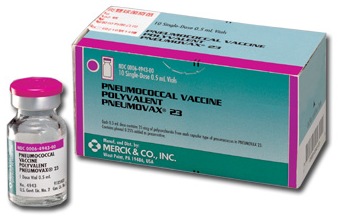Pneumococcal vaccine – Pneumococcal polysaccharide vaccine – PPSV
What is pneumococcal infection?
Pneumococcal disease – infection, caused by a bacterium Streptococcus pneumoniae. The infection can cause the following diseases:
- Pneumonia;
- Bacteraemia (infection blood);
- Middle ear infection;
- Bacterial meningitis.
Streptococcus pneumoniae is spread through contact with an infected person. Most often infection occurs through droplets from the nose or mouth of the patient.
What is the pneumococcal vaccine?
There are two types of pneumococcal vaccines:
- Pneumococcal conjugate vaccine (PKV) – It recommended for babies and toddlers. The vaccine PKV13, which protects against 13 types of pneumococcal bacteria, replaced vaccine PKV7;
- Pneumococcal polysaccharide vaccine (PPSV) – It recommended for certain children and adults.

The vaccines are made from inactivated bacteria. They are administered by injection under the skin or into a muscle.
When and who should be vaccinated against pneumococcal infections?
The vaccine PKV
Vaccination is carried out in the ToR 2, 4, 6 and 12-15 months.
If a child has not been vaccinated or had missed doses, tell your doctor. Depending on the age of the child, he may need an extra dose. Besides, Additional doses may be required in the following cases:
- A child less than five years were vaccinated PCV7 (earlier version of the vaccine);
- There is a chronic disease, which increases the risk of severe disease.
The vaccine PPSV
Vaccination of children
If the child 2-18 years in a high-risk group, perhaps, require vaccinations PPSV, even if it completed a full course of vaccination PKV. High-risk factors include:
- The presence of certain conditions, such as:
- Heart Disease, lung or liver disease;
- Renal failure;
- Serpovidnokletochnaya anemia;
- Diabetes;
- A cochlear implant;
- Leakage of cerebrospinal fluid;
- HIV, AIDS or other diseases, weaken the immune system;
- Missing or damaged spleen;
- Medication, that suppress the immune system.
In some cases, there may be required two doses PPSV.
Adult Vaccination
PPSV recommended for adults:
- At the age of 65 and older;
- At the age of 64 years and younger, who are at high risk, which comprises:
- The presence of certain conditions, such as:
- Lung disease (eg, chronic obstructive pulmonary disease, emphysema, bronchial asthma);
- Cardiovascular disease;
- Diabetes;
- Liver disease (eg, cirrhosis of the liver);
- Alcoholism;
- A cochlear implant;
- Leakage of cerebrospinal fluid;
- Diseases of the immune system (eg, HIV);
- Serpovidnokletochnaya anemia;
- Missing or damaged spleen;
- The presence of certain conditions, such as:
- Living in a nursing home or long-term hospital stay;
- Smoking;
- Taking certain medications, and performing procedures (steroids, medicines for cancer treatment, radiation therapy) – the vaccine should be administered at least 2 weeks before the start of treatment of cancer.
In some cases it may be necessary second dose PPSV. For Example, in five years may need another dose for people aged 19-64 years, who have certain diseases, such as chronic kidney failure or disease, affecting the immune system (eg, HIV / AIDS).
Risks, Related pneumococcal vaccine
The vaccine PKV
Side effects include redness, soreness or swelling at the injection site. It may also have a fever. There are reports, that the pneumococcal vaccine may cause drowsiness and loss of appetite. Usually, all vaccines can have a very small risk of serious complications.
Sometimes, to reduce pain and fever, which may occur after vaccination, ispolyzuetsya paracetamol. In children, the medicine may weaken the effectiveness of the vaccine. It should discuss the risks and benefits, associated with the use of paracetamol with a doctor.
Vaccine PPSV
Half of the people, who get the vaccine have mild side effects, which may include reddening or pain at the injection site. At least 1% with fever, muscle pain and more severe local reactions. In rare cases, there are severe allergic reactions and other serious problems. Nonetheless, pneumococcal disease can cause much greater problems, the vaccine.
Who should not be vaccinated against pneumococcal infection?
Vaccine PKV
A child should not be vaccinated with PCV in the following cases:
- It was a life-threatening allergic reaction to a previous dose of PCV;
- There was a severe allergy to one of the components of the vaccine;
- Moderate or severe illness ( you need to wait recovery).
Vaccine PPSV
It is impossible to vaccinate PPSV in the following cases:
- It was dangerous to the life of an allergic reaction to a previous dose PPSV;
- There was a severe allergy to one of the components of the vaccine;
- Moderate or severe illness ( you need to wait recovery).
Ways to prevent pneumococcal disease in addition to vaccination
- Avoid close contact with infected people;
- Regular MY Ruki, to reduce the risk of infection.
What happens in the event of an outbreak of pneumococcal infection?
In the event of an outbreak, all persons, requiring vaccination, should be vaccinated.
